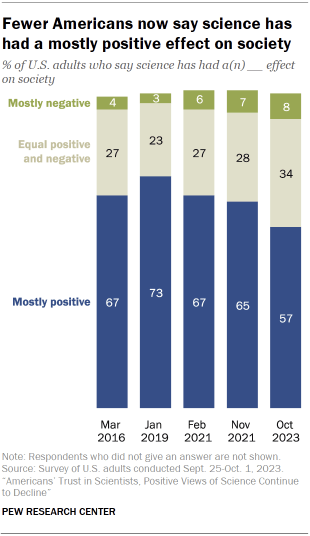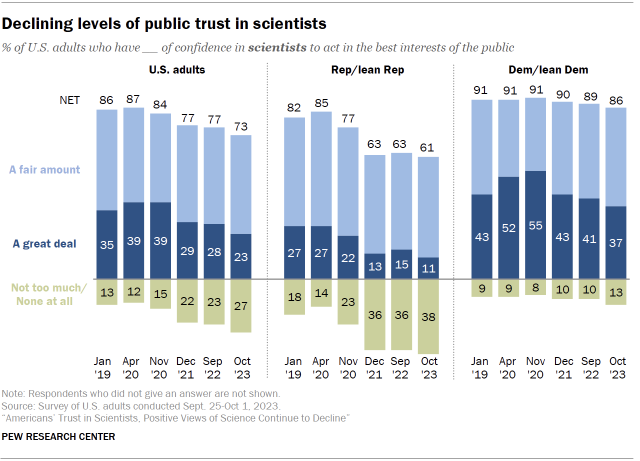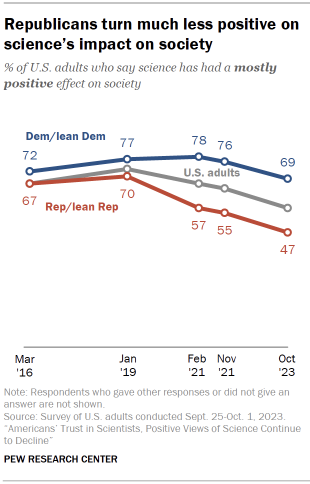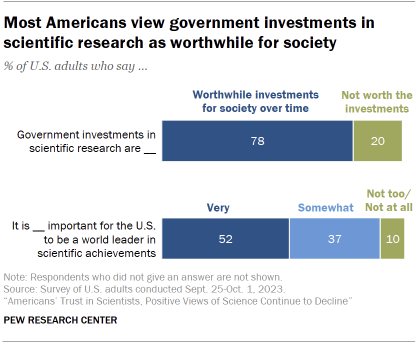Among both Democrats and Republicans, trust in scientists is lower than before the pandemic
Note: For the most recent data on Americans’ trust in science and scientists, read our 2024 report: Public Trust in Scientists and Views on Their Role in Policymaking.
Pew Research Center conducted this study to understand how Americans view science, as well as their levels of confidence in groups and institutions in society. For this analysis, we surveyed 8,842 U.S. adults from Sept. 25 to Oct. 1, 2023.
Everyone who took part in the survey is a member of the Center’s American Trends Panel (ATP), an online survey panel that is recruited through national, random sampling of residential addresses. This way, nearly all U.S. adults have a chance of selection. The survey is weighted to be representative of the U.S. adult population by gender, race, ethnicity, partisan affiliation, education and other categories. Read more about the ATP’s methodology.
Here are the questions used for this report, along with responses, and its methodology.
A new Pew Research Center survey finds the share of Americans who say science has had a mostly positive effect on society has fallen and there’s been a continued decline in public trust in scientists.
In this report, we cover:
- Trust in scientists and other groups (Chapter 1)
- Views of the impact of science on society (Chapter 2)
- Support for government investments in science (Chapter 3)
Key findings

Impact of science on society
Overall, 57% of Americans say science has had a mostly positive effect on society. This share is down 8 percentage points since November 2021 and down 16 points since before the start of the coronavirus outbreak.
About a third (34%) now say the impact of science on society has been equally positive as negative. A small share (8%) think science has had a mostly negative impact on society.
Trust in scientists
When it comes to the standing of scientists, 73% of U.S. adults have a great deal or fair amount of confidence in scientists to act in the public’s best interests. But trust in scientists is 14 points lower than it was at the early stages of the pandemic.
The share expressing the strongest level of trust in scientists – saying they have a great deal of confidence in them – has fallen from 39% in 2020 to 23% today.
As trust in scientists has fallen, distrust has grown: Roughly a quarter of Americans (27%) now say they have not too much or no confidence in scientists to act in the public’s best interests, up from 12% in April 2020.
Ratings of medical scientists mirror the trend seen in ratings of scientists generally. Read Chapter 1 of the report for a detailed analysis of this data.
How scientists compare with other prominent groups
Why does public trust in scientists matter?
People with greater trust in scientists are more likely to align their own beliefs and actions with expert guidance and understanding.
For instance, those with high trust are more likely to have gotten vaccines for COVID-19 and the flu. They are also more likely to say human activity contributes to climate change.
In addition, scientific leaders are concerned that differences in levels of trust by things like party identification, race and ethnicity, and education could contribute to the benefits of science being spread unevenly across society.
The Center survey of 8,842 U.S. adults conducted Sept. 25-Oct. 1, 2023, finds that, despite recent declines in ratings, scientists and medical scientists continue to be held in high regard compared with other prominent groups in society. Smaller shares of Americans express confidence in business leaders, religious leaders, journalists and elected officials to act in the public’s best interests. As with scientists, most of these groups have seen their ratings decline in recent years.
Americans have expressed low trust in federal government and other institutions, like Congress, for decades. And political polarization – the widening gap between the views of Republicans and Democrats across a broad range of issues and attitudes – has come to be a dominant feature of American political life.
Differences between Republicans and Democrats in ratings of scientists and science
Declining levels of trust in scientists and medical scientists have been particularly pronounced among Republicans and Republican-leaning independents over the past several years. In fact, nearly four-in-ten Republicans (38%) now say they have not too much or no confidence at all in scientists to act in the public’s best interests. This share is up dramatically from the 14% of Republicans who held this view in April 2020. Much of this shift occurred during the first two years of the pandemic and has persisted in more recent surveys.

Confidence in scientists has also moved lower among Democrats. The share of Democrats and Democratic-leaning independents with a great deal of confidence in scientists – which initially rose in the pandemic’s first year – now stands at 37%, down from a high of 55% in November 2020. But unlike Republicans, a large majority of Democrats (86%) continue to express at least a fair amount of confidence in scientists to act in the public’s best interests. The overall differences in partisan views remain much more pronounced today than they were prior to the coronavirus outbreak.
One of the starkest illustrations of polarization in views of science is the drop in the share of Republicans who view the societal impact of science positively.
Fewer than half of Republicans (47%) now say that science has had a mostly positive effect on society. In 2019, 70% of Republicans said that science has had a mostly positive effect.

A majority of Democrats (69%) continue to say science has had a mostly positive effect on society, though this share is 8 points lower than it was in 2019.
Republicans were largely critical of the country’s response to the coronavirus outbreak. For instance, large shares said too little priority was given to respecting individuals’ choices, supporting businesses and economic activity, and meeting the needs of K-12 students. In addition, many Republicans felt that public health officials’ personal views had too much influence on policy and that officials were too quick to dismiss views that challenged their scientific understanding.
Government investments in science
Despite declines in ratings of scientists and science, a large majority of Americans continue to see government investments in science as worthwhile. And most place at least some importance on the United States being a world leader in scientific achievements.

About eight-in-ten Americans (78%) say government investments in scientific research are usually worthwhile for society. Far fewer (20%) think these investments are generally not worthwhile. Large majorities across demographic and education groups see government investments in scientific research as worthwhile, as do large majorities of both Democrats and Republicans.
In addition, 52% of Americans think it is very important for the U.S. to be a world leader in scientific achievements; an additional 37% think this is somewhat important. These shares are more or less unchanged since last year.




